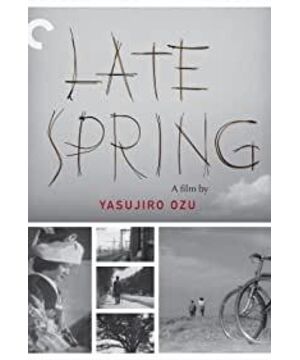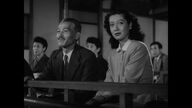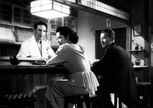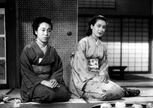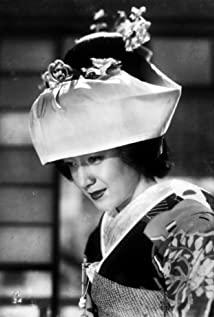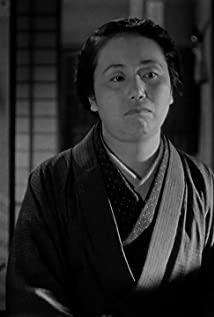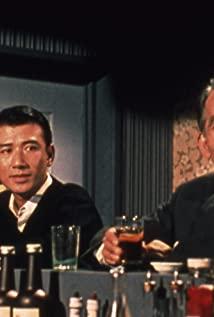Taiwanese director Hou Hsiao-hsien, who was deeply influenced by Ozu's timeless, long and silent camera language, once said: " My favorite is "Late Spring", which was filmed by Ozu when he was forty-six years old. The film is this "Late Spring". In terms of the name match, "Late Spring" seems to be after "Early Spring", but it was filmed in 1949, which was seven years earlier than "Early Spring". Also, Setsuko Hara plays a girl named Noriko, which is in the same vein as "Maiqiu".
In fact, this is indeed a milestone in Ozu's many works. The appearance of Hara Setsuko gave birth to a symbol of Ozu's film. The first picture that flashed.
At that time, Hara Setsuko was so young, so young that I have said many times, the lightness between her brows has not yet gathered, and her signature smile is so bright that I have the illusion that the muscles on her face seem to be involved. It reaches an extreme state, like the peak of a parabola, and after that, it turns sharply and turns into crying. I don't know if Hara Setsuko wanted to laugh like this on purpose (at Ozu's request) or just by nature. Looking at Yanshou Huanfei in Ozu's movie, she was the only one who laughed to the "edge" of laughter. The eyes turned black for a while, Hara Setsuko smiled, and looked sad for no reason. I think that the sorrow does not exist, but the shadow of laughter. This kind of laughter, apart from Hara Setsuko, is unique in my not comprehensive but rich enough viewing experience.
Li Zhizhong, he was very old when Wenders visited in 1983, so back to more than 30 years ago, he should be in his prime, as Wenders said, he should not be at the age" "Growing old", in fifty films shot in different eras, he has grown old, so old that it is natural, so old that he is not happy. You can't tell the difference between Li Zhizhong in "The Taste of Saury" ten years later and Li Zhizhong in "Late Spring" ten years ago. He is like an unchanging background, stabilizing the purity, harmony and eternity of the world in the picture. He is a prop and transcends a prop. Although Kasa Chi-joo himself humbly said "everything belongs to Ozu", he is a living person after all. In the frame of the frame, the style of Ozu behind and the character of Kasa Chi-joo in front Gradually blended, presented as the soul of a character on the screen. The father and brother played by Li Zhizhong are not despots in the traditional patriarchal sense at all. They are generous, open-minded, silent and forbearing. Even if the behavior of challenging the rules will temporarily anger them, they will later achieve understanding through their inner retreat, care and self-examination. complete. Without exception, these characters are reticent, mostly repeating other people's words, and even repeating their own inner exclamation: "Yes, it is like this." Only a few words said a heart-wrenching and tactful.
The same is true of the father in "Late Spring". From the beginning to the end, except for a parting message to his daughter at the end, he did not say a complete sentence. He always smiles and responds, and is a loving father. And the film that Hou Hsiao-hsien said was "extremely thorough" actually had a very simple plot: "The twenty-seven-year-old Noriko and her father depended on each other in North Kamakura, and her sweetheart slipped away. A continuation of a lie, Noriko was willing to put on a wedding dress, but did not know that his father was silently facing the rest of his lonely life." (From the introduction of the film)
It is precisely because of the simplicity of the plot, the simplicity of the extreme that it achieves a profound contemplation. The movie screen first shows the external state of the characters, and secondly, there are emotional ups and downs that we can't see. This contrast of light and dark is evenly matched, which promotes the process of the story, and the wonder is born. I think this is not so much a talent as it is a talent that can be met but not sought after. To go beyond the limitations of the picture and create an atmosphere lingering with reverberation, that is the strength of words, but the weakness of images. , but Ozu has successfully overcome this defect of the image, you can always see the rich and infinite heart from the simple and limited picture.
In the film, Noriko lives happily by her father's side. You can say that this state of life is fulfilling and hopeless, or you can say that it is unknowingly and unconsciously. Like a small river flowing happily, Noriko could not imagine what it would be like to change the flow. As an adult woman, classmates get married, have children, and friends have divorced, and she hasn't moved, doesn't she have her own thoughts? The film did not "actively" show Noriko's thoughts, but we can still see clues from her interactions with her father's student uniform.
Maybe she didn't even realize it, or she didn't think about it because of some inexplicable fear (fearing that the current state of life, which she thought was ideal for her father and herself, would be threatened and changed). Ripples in the bottom of her heart refused to name her, and even used the excuse that Hattori already had someone to comfort herself, so as to get a safe "escape and guarantee". When Hattori made a more explicit hint that she wanted to go to the violin concert with Noriko, she pretended to be. Inexplicably declined, she just sticks to her ideal living state, and does not hesitate to be the enemy of her true heart, and she resolutely rejects all trends that can only lead to her own happiness. She puts her own destiny closely with her father's closely linked together.
Noriko has gone into a misunderstanding. She is undoubtedly a woman with a cleanliness addiction, and her biggest misunderstanding is that while connecting her destiny with her father, she also thinks that her father should be like this, otherwise it is an unforgivable betrayal. At the beginning of the film, Noriko went to Tokyo and met an old friend of her father who had just resumed the string. He bluntly said that he felt "unclean", and the other party laughed. The elders' forgiveness for the disrespectful remarks of the ignorant younger does not mean that her heart knot can be resolved in laughter. In fact, this is the heart disease of Noriko. When her father lied about his intention to continue the string in order to get her to agree to a blind date, Noriko, who has always been considerate and graceful, reacted particularly violently, which reminded me of Sato, an expert on Japanese Ozu studies. Tadao pointed out in the book "The Art of Yasujiro Ozu" that there is a kind of "baby" mentality in Ozu's films. The so-called Jiao is to rely too much on the goodwill of family members. Jiao does not just refer to acting like a spoiled child, but may also include "eccentricity, surly, awkwardness, resentment, vomit, and self-abandonment". All in all, all the inner dark side. To act like a spoiled child is to indulge, to release all the dark sides of one's heart and wait for others to clean up. And the feeling of treating oneself as a weak person and expecting the mercy of others. If there is no one to clean up and no one to care for, then you will be filled with resentment and wounded in your heart.
The well-behaved daughter Noriko turned into a "curious" daughter Noriko, and she got into trouble with her innocent father. A daughter's attachment to her father seems to be particularly strong in the East, especially a daughter who grew up with a missing mother's corner. She may subconsciously feel that no man in the world is as perfect as her father, and she can't find such indulgence anywhere else. and secure love. After a cold war with her father and an unnamed anger with her friends, Noriko's stubborn heart is covered with a stubborn appearance and secretly changes. Ozu movies are used to release sadness, be considerate of others, and soothe the pain, so he will not let his "curious" daughter continue to be grumpy. Noriko finally agrees to a blind date, and both the father and the aunt who has been discussing this matter are relieved.
Ozu, who pays attention to details, arranged an interesting conversation here: I don't know if Noriko agreed to a blind date, and before the eight characters were written, the good aunt was worried, but she was worried about the trivial matter of sesame and mung bean, the other party's name It's called Kumataro Satake, and she worries that Noriko doesn't like this name, and that everyone will not be able to address this niece-in-law after they become a family: "Kumataro's name is like a chest full of hair, how should we call him? Kumatarou's words are like calling a bandit, and calling Axiong is like calling a fool, of course you can't call him Xiaoxiong, I'm going to call him Xiaozhu." The
aunt couldn't grasp the point and was nagging unfoundedly, the woman is really old So comedic? At least some women are, right? The life of Ozu's observation is dedicating to us such a group of "living treasures", which is irritating, ridiculous, and respectable.
Like the mother-daughter trip in "Autumn Harmony", the father and daughter in "Late Spring" finally reached an understanding through a trip. On a trip to Kyoto, Noriko meets her father's friend's new wife, and the two seem so harmonious that Noriko can't help but feel ashamed for her "unclean" remarks. Everything has two sides. When I was young, I was obsessed with the side I saw first. Noriko has a lot to learn. When she "resisted" for the last time, begging her father to let her stay with her, her father, who had always been reticent, made a long speech. This is the concept that Ozu repeatedly discusses and emphasizes in the film: couples cannot be happy at the beginning, they must go through common ups and downs before happiness will come, and only then can they understand the taste of happiness. In Ozu's view, marriage is to a certain extent a practice. If you can't survive it, your previous achievements will be abandoned; if you survive it, you will be reborn from the ashes. This is also the side that young Noriko can't see. At this point, Noriko's heart knot is finally resolved, and she can get married with confidence.
This is a marriage scene that people talk about with relish: Setsuko in full dress smiles like a flower, and then tears in her eyes, saying goodbye to her father, saying goodbye to her growing years, and her life enters another stage, and the invisible umbilical cord is cut off at this time. , from then on to an independent life.
At the end of the film, the father who returns home alone cannot help but be reminiscent of the mother in "Autumn Harmony". Coincidentally, the daughter married in "Late Spring" and the mother who sent her daughter away in "Autumn Harmony", Also played by Setsuko Hara, the feeling of passing through different stages of life spontaneously arises.
This is a film immersed in Japanese traditional culture: Japanese gardens, temples, watching Noh dramas, watching tea ceremonies, and the traditions in the lens are quiet and beautiful; this is another film of "the west wind is spreading to the east": English bar The name of the store, the name of a Hollywood movie star that people say casually, and even old-fashioned people like my aunt use the handsome foreigner to describe their blind date in an attempt to impress Noriko. The fission of Japanese society after the war is evident.
As mentioned earlier, like "Maiqiu", this is another film in which Otsu set the story location in Kitakamakura, so we revisited the local temples, forests, beaches, and Kitakamakura half a century ago. How secluded it is, filled with the pleasant light of a sunny slope. So I remembered what Haruki Murakami wrote in the book "The Comeback of Murakami Asahido":
"I used to live in a place only 20 minutes away from Kamakura, and I have visited Kamakura a lot in the past few years. Most of the time, I get off at Kita Kamakura Station and take a comfortable walk to Kamakura. If you have time, take the Enoshima Tram and walk to Enoshima... The scenery of the Shonan coast is very interesting to me. In other words, there is a feeling that is difficult to describe in words..."
The world of Ozu's films is becoming more and more full in his heart.
View more about Late Spring reviews


